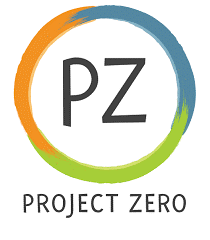Organization Description
Founded by philosopher Nelson Goodman at the Harvard Graduate School of Education in 1967, Project Zero began with a focus on understanding learning in and through the arts. Today, Project Zero is an intellectual wellspring, nourishing inquiry into the complexity of human potentials – intelligence, understanding, thinking, creativity, cross-disciplinary and cross-cultural thinking, ethics – and exploring sustainable ways to support them across multiple and diverse contexts. Anchored in the arts and humanities, and with a commitment to melding theory and practice, they continue to work towards a more enlightened educational process and system that prepares learners for the world in which they will live, work, and develop.
Impact of SCE Support
In our first engagement with Project Zero, we partnered with both them and Common Sense Media to identify the most pressing digital topics that youth face today. This partnership ensured that Common Sense Media’s new middle and high school Digital Citizenship Curriculum was solidly based on the digital dilemmas that young people today are experiencing, as heard from youth themselves. The goal was for the new resources to resonate with and engage young people in a way that effectively develops the skills and habits of mind to use technology to learn, create, and collaborate.
By engaging directly with youth, Project Zero explored topics such as media balance and well-being; digital footprint and identity, relationships and communication; cyberbullying, digital drama and hate speech; news and media literacy; and privacy and security. In addition to informing Common Sense Media’s new curriculum, the findings were published in a report that provides a wealth of information to ground practitioners with a solid overview of research related to digital life and digital dilemmas. This research has propelled meaningful dialogue on ways to support young people as they navigate the digital landscape.
Project Zero’s most recent project re-imagines the aim of supporting youth digital well-being in an age of unprecedented connectivity. Project Zero will begin with empirical research that will help adults better understand the challenges today’s youth face in their digital lives. Then, they will engage youth in a participatory design project to develop a Digital Well-being Toolkit, which they will pilot and disseminate in partnership with youth-focused organizations across the country.
Project Zero is a member of SCE’s Youth Voice Challenge cohort. This group of exemplary organizations seeks answers to the question: How can young people inspire their peers to use technology in healthy ways and make digital spaces better for everyone? Learn more about the Challenge here.
Why We Invested
This project will deepen our understanding of young people’s digital lives. This work builds on Project Zero’s Digital Dilemmas Project, which leveraged surveys, interviews, and ethnographic research to explore: the benefits and challenges teens face in today’s connected world; how young people respond to digital dilemmas related to their well-being, close relationships, communities, and civic life; and how adults are supporting (or failing to support) youth as they navigate digital life. Through this new partnership, Project Zero will be able to translate those research findings into new knowledge and practical, youth-centered tools for digital well-being.


